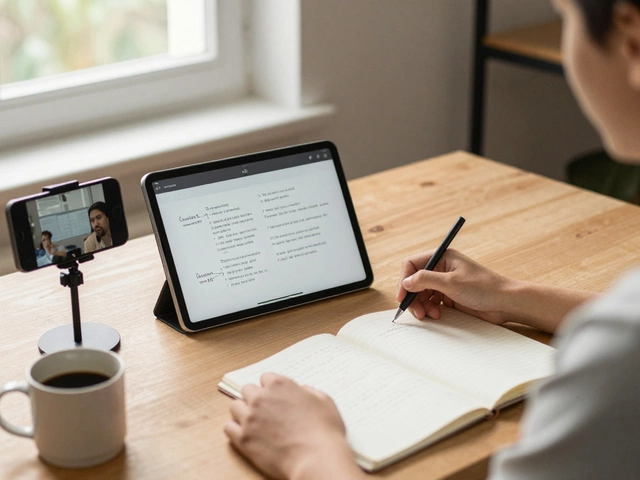Diving into the coding world can seem like trying to decipher an alien language, but don't fret! The beauty of coding is that it's all about logic, creativity, and problem-solving. Are you ready to unravel the mysteries of this digital wizardry?
First things first, what language should you learn? It's a tough choice, but think about what gets you excited. Want to build websites? HTML, CSS, and JavaScript are your best pals. Dreaming of creating the next big app? Start with Python or Java. Each language has its quirks and perks, so choose one that aligns with your goals.
Once you've picked a language, setting up your workspace is next. You'll need a comfortable spot to code, a trusty computer, and some software – called an IDE (Integrated Development Environment) – where you'll write and test your code. Think of it as your coding canvas. It's where the magic happens.
- Choosing Your First Programming Language
- Setting Up Your First Development Environment
- Understanding Basic Concepts
- Finding Learning Resources
- Staying Motivated and Practicing
Choosing Your First Programming Language
So, you're keen to start coding as a beginner, but with so many languages, where do you even begin? Picking the right language is like choosing your first bicycle. You want something that fits your needs and isn't overly complicated.
What Do You Want to Build?
Consider what you want to build. If you're interested in web development, then HTML, CSS, and JavaScript are your foundational trio. For something more data-driven or involving AI, Python is your go-to. Apps on Android? You'll wanna look at Java or Kotlin.
The Ease of Learning
Python wins a lot of popularity contests here. It's known for its readable syntax and short learning curve, making it perfect for beginners. JavaScript comes a close second, especially for those curious about making interactive websites.
Industry Demand
Let's talk job prospects. Knowing which languages are in demand can guide you too. According to various tech job boards, Python, Java, and JavaScript consistently top the demand charts. So, if you're career-focused, that info might sway you.
| Language | Use Case | Learning Difficulty |
|---|---|---|
| Python | Web Development, AI, Data Science | Easy |
| JavaScript | Web Development | Moderate |
| Java | Mobile Apps, Enterprise Solutions | Moderate |
There's no wrong choice here, only different paths. Whether you opt for JavaScript, Python, or another language, the key is to start and stick with it. Every programmer sets out as a beginner, after all. Happy coding!
Setting Up Your First Development Environment
Alright, you've chosen your programming language – awesome! Now, let's talk about your workspace, the hub of all your coding activities. It's like setting up your musical studio but for code, where every tool has its role.
Choose Your Editor or IDE
First, you'll want to choose an Integrated Development Environment (IDE) or a text editor. What's the difference? Well, an IDE is like a Swiss Army knife; it has everything you need built-in, like debugging tools and code compilation. Popular choices include Visual Studio Code, PyCharm for Python, and IntelliJ IDEA for Java. These offer tons of features to make coding easier.
Install Your Language Compiler or Interpreter
If you're leaning towards Python, you'll install the Python interpreter. For JavaScript, browsers are your interpreters. If you picked Java, the Java Development Kit (JDK) is essential. Think of these tools as the translators turning your code into action.
Optimize Your Setup with Extensions
Extensions or plugins are little magic wands, adding more power to your editor. For example, Prettier helps keep your code tidy, while ESLint checks for errors in JavaScript. These tools make your life easier and your code cleaner.
Final Steps: Configuration and Testing
Before diving in, take time to configure your environment. Set your preferences, themes, and shortcuts. This makes everything feel like home. Then, write a simple 'Hello World' program in your new setup to ensure everything works splendidly. It's your first foray into live coding!
Setting up might seem tricky, but with these steps, you'll be coding hassle-free. Happy coding, and remember, every expert was once a beginner!

Understanding Basic Concepts
Alright, so you've picked a programming language and set up your development environment. Now comes the fun part—getting to grips with the basic ideas that drive the coding universe. These concepts are the building blocks, and understanding them is key to becoming a solid coder.
Variables and Data Types
Think of variables as containers for storing data. They have names, and they hold values. For example, if you're coding a calculator, a variable might store the result of an addition. They're essential in programming and come in various data types like integers, floats, and strings. Each has its use; integers are for whole numbers, floats for decimals, and strings for text.
Control Structures
Fancy term, right? But all it means is the code that makes decisions and loops. Imagine you're creating a game: you need code to decide if a player loses a life when hit. That's a control structure in action. You'll frequently hear about if statements (if this, then that) and loops (repeat until you're done).
Functions
Functions are like little programs within your program. They perform specific tasks and can be reused whenever needed, saving you a ton of repetitive coding. Think of them like commands you can create for yourself. Want a function to calculate the square root of any number? Done. Just call it whenever you need.
Debugging
Ah, debugging! The detective work of programming. It's all about finding and fixing errors or bugs in your code. You'll become a pro at this because let's face it, errors are unavoidable. But fear not, you'll learn to read error messages and figure out what's going wrong.
Here’s a little encouragement: even the pros spend a huge chunk of their time debugging. It's part of the journey, so embrace it!
Mastering these concepts gives you the foundation to tackle more advanced topics, but remember, the key is practice. Playing around with snippets of code is a great way to learn. Keep experimenting and learning from your mistakes, and soon coding will feel like second nature.
Finding Learning Resources
So you've picked a language and set up your workspace. Now, the next question is: where do you actually start learning? The internet is bursting with resources, which is awesome, but it can also be a bit overwhelming. The trick is knowing where to look and what suits your learning style best.
First, let's talk about online courses. Platforms like Codecademy, Coursera, and Udemy offer interactive lessons that can guide you from zero to hero. They're perfect if you like structured content and the feeling of progression through a course. Plus, many offer certificates upon completion, which is a nice bonus.
If you prefer a more hands-on approach, tutorials on YouTube can be your best friend. Channels like The Net Ninja and freeCodeCamp offer comprehensive video series on just about every coding topic out there. The visual aid and step-by-step walkthroughs can make complex concepts easier to digest.
Books and Written Guides
For those who like a good read, books can be a solid choice. Authors like Eric Matthes and Zed Shaw have crafted well-regarded introductions to programming. Don't forget about blogs and written tutorials too. Sites like Medium and Dev.to are gold mines for all sorts of coding tips and tricks.
Interactive Online Platforms
Consider platforms like LeetCode or HackerRank for practice problems that boost your skills through challenges. They’re especially good if you're aiming for a coding interview or just want to test what you've learned in a more interactive way.
Coding beginners often overlook the power of learning communities. Whether it's on Reddit, Stack Overflow, or even Discord servers, connecting with others learning to code can offer support and answer questions you might get stuck on.
| Platform | Type of resource | Free option |
|---|---|---|
| Codecademy | Online Course | Yes |
| YouTube (The Net Ninja, freeCodeCamp) | Video Tutorials | Yes |
| HackerRank | Practical Challenges | Yes |
Now you're armed with a treasure map of resources, ready to jumpstart your coding adventure. Remember, the key is to find what resonates with you and run with it. Whether you prefer to watch, read, or practice, there's a resource waiting for you.

Staying Motivated and Practicing
Staying motivated while learning to code can be challenging, but it's doable with the right mindset and strategies. It's normal to hit roadblocks, but remember, coding is like solving puzzles—sometimes the pieces don’t fit right away. Here's how you can keep pushing forward.
Set Achievable Goals
First, set realistic and incremental goals. This isn't a sprint; it's a marathon. Celebrate small victories, like completing a new project or mastering a tricky concept. Achievements, no matter the size, boost morale and keep you engaged.
Join a Community
Connecting with fellow learners can be a game-changer. Whether it's an online forum or a local study group, sharing experiences and tips keeps you motivated. Websites like codeacademy.com have vibrant communities of coding beginners just like you.
Practice Regularly
Consistent practice is key. Dedicate a specific time each day to code, even if it's just 30 minutes. This repetition builds confidence and skills over time. Remember, the more you do it, the easier it becomes!
Track Your Progress
Seeing how far you’ve come can be incredibly motivating. Keep a journal or use an app to log your learning journey. When you look back and see your progress, it serves as a reminder of how much you've accomplished.
Experiment
Don’t be afraid to break things. Test out new ideas or tweak existing codes to see what happens. This hands-on approach deepens understanding and makes learning fun.
Reward Yourself
Set rewards for achieving your coding goals. Whether it's watching your favorite show or indulging in a treat, having something to look forward to makes the journey enjoyable.
In conclusion, keep at it. Staying consistent and building on your experiences will help you become a proficient coder in no time. Remember, every great coder was once a beginner, just like you!





